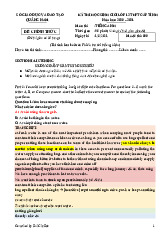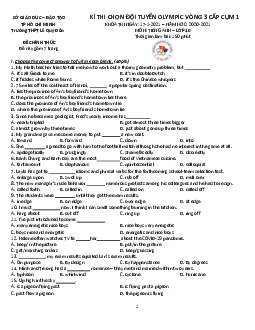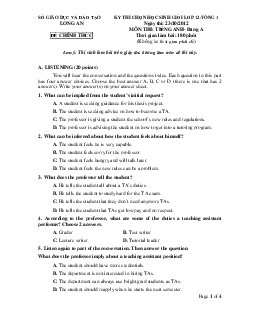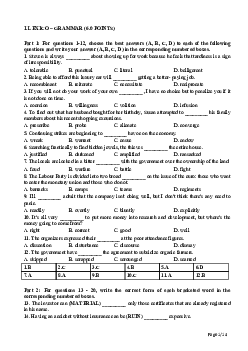





Preview text:
UBND TỈNH BẮC NINH
ĐỀ THI CHỌN HỌC SINH GIỎI CẤP TỈNH
SỞ GIÁO DỤC VÀ ĐÀO TẠO NĂM HỌC 2010 - 2011
MÔN THI :TIẾNG ANH – LỚP 12 – THPT ĐỀ CHÍNH THỨC
Thời gian làm bài: 180 phút (Không kể thời gian giao đề)
Ngày thi 22 tháng 3 năm 2011 ============== §iÓm bµi thi Gi¸m kh¶o 1 Gi¸m kh¶o 2 Sè ph¸ch B»ng sè: Hä tªn: Hä tªn: B»ng ch÷: Ch÷ ký: Ch÷ ký:
* Ghi chó: §Ò thi gåm 06 trang. ThÝ sinh lµm bµi trùc tiÕp vµo ®Ò thi.
PART I. Pronunciation, Vocabulary and GRAMMAR (10 pts)
I. Choose the word that has the underlined part pronounced differently from the others’ (0.5 pt) 1. A. owl B. cow C. arrow D. powder 2. A. sew B. knew C. dew D. few 3. A. bought B. sought C. fought D. drought 4. A. experience B. exhibition C. expensive D. exercise 5. A. rhinoceros B. who C. headache D. whale
II. Pick out the word whose stress pattern is different from that of the others in each group (0.5 pt). 1. A. impressive B. composition C. international D. competition 2. A. instrument B. inflation C. regional D. satellite 3. A. consider B. interactive C. behavior D. attachment 4. A. calculate B. confidence C. engineer D. pentagon 5. A. monastery B. dependence C. associate D. composer
III. Choose the word or phrase which best completes each sentence. Circle A, B, C or D.(1.5 pts)
1. According to the _____ of the contract, tenants must give six months’ notice if they intend to live. A. laws B. rules C. details D. terms
2. His change of job has _____ him with a new challenge in life. A. introduced B. initiated C. presented D. let
3. _____ she’s got a job that she likes, she’s a lot happier. A. Now that B. Just as C. Since when D. Just now
4. I don’t want lots of excuses, I just want to hear the _____ truth. A. clear B. plain C. pure D. right
5. She _____ to being a bit nervous about making her speech. A. asserted B. granted C. acknowledged D. confessed
6. The last bus had gone so we were _____ with the problem of how to get home that night. A. affronted B. caught C. faced D. trapped
7. The candidate still expects to be re-elected _____ the results of the latest opinion poll. A. without B. notwithstanding C. nevertheless D. apart
8. At the most important stage of the season, the footballer was troubled by the _____ of an old injury. A. recurrence B. renewal C. restart D. resumption
9. _____ the public’s concern about the local environment, this new road scheme will have to be abandoned. A. As regards B. In view of C. In the event of D. However much
10. I could tell from the _____ look on her face that something terrible _____.
A.frightened/was B.frightening/would C.frightened/had D.frightening/had been 1 happened happen happened happening
11. A: “What are the office hours where you work?”
B: “ …............., everyone comes in at eight and leaves at five.” A. General B. In generally C. In the general D. In general
12. It isn’t quite…........ that he will turn up at the meeting. A. certain B. exact C. right D. sure
13. After waiting for an hour he realized that the bus was…................ to come. A. improbable B. impossible C. uncertain D. unlikely
14. At around two years of age, many children regularly produce sentences......... three or four words. A . are containing B. containing C. contain D. contains
15. These tennis courts don't ......... very often. Not many people want to play. A . got used B. used C. get used D. get use
IV. Read the passage below and look carefully at each line. Some of the lines are correct, and some
have a word which should NOT be there. Underline the word which should NOT be there and write
it in the space provided. (1.5 pt)
In nowadays it is becoming increasingly popular for 0. In
students to go on an exchange program. This is especially 00. √
popular in the Europe. In such programs, students can 1.……………………
to go abroad and study at a foreign university for a term 2.……………………
or two, and these studies count towards their degree. 3.……………………
This arrangement has several of disadvantages. 4.……………………
Students have the opportunity to be practise the foreign 5.……………………
languages what they have learnt in school. They meet 6.……………………
different cultures and experience a different way of life. In 7.……………………
addition, they learn about different ways of thinking in their 8.……………………
own studying subject and get a broader view of the issues. 9.……………………
For example, one Australian student who was studying at 10..…………………
agriculture found different types of the farming in England 11………………….
very interesting. Finally, they also meet to exchange students 12………………….
from other countries, so they experience a really 13………………….
international environment. This experience will hopefully 14………………….
result in a more better understanding between nations. 15………………….
V. Supply the correct form of the VERBS in bracket. (2 pts)
a. Why didn’t you tell me you could lend me the money? I (1- not borrow) ______________ it from the bank.
b. He is walking (2. hurry) ____________ to the place where his ex-wife, a famous naturalist now (3.
lie) ___________ (4. bury) ___________ among the animals she loved so much.
c. We will see Alice at the corner, she (5. wait) ____________ for us when we (6. arrive) ____________
d. He resents (7. tell) ____________ what (8. do) __________.
e. Her mother (9. go) ____________ `abroad last month, so it (10. not be) ____________ her you saw at the theatre last Sunday.
VI. Complete the sentences with the phrasal verbs given and put them in the correct tense (2 pts).
bump into/ get down/ shut up/ stop off/ con into/ get into/ get up/ talk into/ get out/ talk out of
1. I can’t reach those books on the top shelf. Would you _______ them _____ for me, please?
2. That sneaky real estate agent _______ me _____ selling her my house for a lot less than it was worth.
3. My parents live between my job and my home, so sometimes on the way home from work I ________ _____ for a visit.
4. Sam’s wife didn’t want to go camping with him, but he finally _______ her _____ it. 2
5. Carlos __________ _____ the table, and a glass of wine fell on the floor.
6. All you ever do is talk, talk, talk. Will you please _______ _____?
7. It sure was hot yesterday. It must have _________ ______ to 100 degrees.
8. Our daughter has decided to get her nose pierced, there’s no way we can _________ her _____ it.
9. I found my old army uniform in the attic, and I can still __________ ________ it even though it’s twenty-five years old.
10. My teacher caught me cheating on the test today, and he said he’s going to call my parents
tomorrow to tell them. How am I going to ________ ______ of this mess?
VII. Give the correct form of the words in bold in the same line. Write your answers on the
numbered blanks. (0) has been done as an example. (2 pts)
Recently (1) ___________ have become extremely worried about the world's 1.SCIENCE
population. The problem is particularly acute in the (2) _____________ 2.DEVELOP
countries.(3) ____________, the natural resources are becoming inadequate 3. FORTUNE
for the support of the increasing population. But the (4) ____________ of 4. PLACE
natural resources by artificial products is not always possible.
Therefore, it is necessary to conserve these (5) _______________ resources 5. VALUE
for as long as possible. The (6) _____________ of artificial products is often 6. UTILISE
important. This is (7) ____________ so in every culture. For without 7. PARTICULAR
(8) _____________ it would be impossible to increase food production. Even 8. FERTILE
though there is a risk of (9) _____________ by their use. One is left with me 9. POLLUTE
(10) ___________ problem of larger population requiring more and more food. 10. SOLVE PART II. READING (5 PTS)
I. Read the following text and choose the best answer for the questions below (1 pt).
May 7th 1840 was the birthday of one of the most famous Russian composers of the nineteenth
century: Peter Ilyich Tchaikovsky, the son of a mining inspector. Tchaikovsky studied music as a child
and later studied composition at the St. Petersburg Conservatory. His greatest period of productivity
occurred between 1876 and 1890, during which time he enjoyed patronage of Madame von Meck, a
woman he never met, who gave him a yearly living stipend. Madame von Meck later terminated her
friendship with Tchaikovsky, as well as his living allowance, when she, herself, was facing financial
difficulties. It was during the time of Madame von Meck’s patronage, however, that Tchaikovsky
created the music for which he is most famous, including the music for the ballets of “Swan Lake” and
“The Sleeping Beauty”. Tchaikovsky’s music, well-known for its rich melodic and sometimes
melancholy passages, was one of the first that brought serious dramatic music to dance. Before this,
little attention had been given to the music behind the dance. Tchaikovsky died ostensibly of cholera on
November 6th 1893, though there are now some scholars who argue that he committed suicide.
1. The best title for this passage could be ______.
A. “The Life and Music of Tchaikovsky”
B. “Development of Tchaikovsky’s Music for Ballets”
C. “Tchaikovsky’s Relationship with Madame von Meck”
D. “The Cause of Tchaikovsky’s Death”
2. According to the passage, all of the following describe Madame von Meck EXCEPT ______. A. she had economic troubles B. she was generous
C. she was never introduced to Tchaikovsky
D. she enjoyed Tchaikovsky’s music
3. According to the passage, Tchaikovsky’s music is most well-known for ______.
A. its repetitive and monotonous tones
B. the ballet-like quality of music
C. the richness and melodic drama of the music D. its lively, capricious melodies
4. Which of the following is NOT mentioned in the passage?
A. Tchaikovsky’s influence on ballet music.
B. Tchaikovsky’s unhappiness leading to suicide.
C. The patronage of Madame von Meck.
D. Tchaikovsky’s productivity in composing. 3
5. It can be inferred from the passage that ______.
A. it was not the music behind the dance that made Tchaikovsky famous
B. there is suspicion on the cause of Tchaikovsky’s death
C. Madame von Meck was one of the most famous Russian composers
D. Madame von Meck was one of Tchaikovsky’s girlfriends
II. Look at the sentences below. Read the text on the next page to decide if each sentence is correct or
incorrect. If it is correct, mark T at the end of each statement. If it is incorrect, mark F at the end of
each statement. (1.0 pt)
The millennium Stadium, Cardiff
A new sport stadium opened in Cardiff, capital of Wales, in June 1999. The stadium stands proudly
over the city as there aren’t many other high buildings. It was built on the site of the world’s famous
Cardiff Arms Park rugby stadium.
The original Cardiff Arms Park was a piece of ground next to the River Taff, given to the city
residents in 1803 by the Marquis of Bute. The idea was that it would be used for leisure activities. The
first sporting event on the piece of ground was in 1848 when a cricket match was organized but it
wasn’t until 1881 that the first seating area of 300 seats was built. Over the next hundred years, Cardiff
Arms Park became well known as a location for many important rugby matches.
By the 1990s it had become clear that the stadium was no longer big enough. At that time, there was
room for 53,000 people in the Cardiff Stadium (including 11,000 standing). This total number would
soon be reduced by a law on safety which stopped people standing in stadiums. A number of different
choices were looked at. One was to expand the size of the existing stadium, increasing the number of
seats by one- third. Another suggestion was to find another site somewhere in Cardiff to build a new
stadium. But in the end it was decided to knock down the old stadium and build a new one on the same
site. Work began on 27 April 1997. It was the first stadium in Britain to have a moving roof so the
whole stadium can be covered if it rained or the roof can be left open if it is fine. Another successful
design feature is that wherever you sit in the stadium you have an excellent view, even if you’re in one of the corners.
The stadium is just a few minutes’ walk from the Central Station with bus stops nearby so it is in a
perfect location. If you happen to be in Cardiff, you can take a tour of the stadium. Climb to the top and
enjoy the views, run down the players’ tunnel and imagine yourself being cheered by 72,000 people or
visit the changing rooms, training rooms and medical rooms. Tours take place Monday- Saturday (first
tour departs 10am, last tour departs 5pm), Sundays and public holidays (first tour departs 10am, last
tour departs 4pm), but there are no tours on match or event days. Tours leave from Gate 3 (Westgate
Street). You should arrive 10 minutes before departure of the tour and payment is due upon arrival. For
prices of a Millennium Stadium Tour call 029 1082 2228.
1. ____ The stadium is taller than most other buildings in Cardiff.
2. ____ Seats were built before the first sporting event at Cardiff Arms Park.
3. ____ New rules meant fewer people would be able to watch a match in the stadium.
4. ____ The idea of building a new stadium in a different part of the city was considered.
5. ____ It is possible to change the position of the roof depending on the weather.
6. ____ Seats in the middle of the stadium have a better view than those in the corners.
7. ____ The stadium is easy to reach by public transport.
8. ____ On a tour, it is possible to see the parts of the stadium used by players.
9. ____ The last tour finished at 4 pm on a Sunday.
10.____ Tours should be booked and paid for by phone in advance.
III. Read the following passage and circle the best answer A, B, C or D (1.0 pt).
Dogs are probably much cleverer than most people think, scientists say. They are convinced that dogs
can count and that the animals try to (1) _______ different messages through the pitch and pace of their
barks. Animal behaviorists used to think their bark was simply a way of (2) _______ attention. Now a
new study suggests that individual dogs have (3) _______ barks with a range of meanings. For example, 4
dogs usually use high-pitched single barks when they are (4) _______ from their owners and a lower,
hasher super bark when strangers (5) _______ towards them or the doorbell rings.
Dogs also know when they are receiving fewer treats because they have a basic mathematical ability
that (6) ________ them to tell when one pile of objects is bigger than another. But to count, an animal
has to recognize that each object in a set (7) _______ to a single number and that the last number in a
(8) _______represents the total number of objects.
The theory has been tested on eleven dogs. They were first (9) _______ treats before a screen was
lowered so that the treats were out of (10) _______. The treats were left as they were or some were
added or taken away. If a treat was added or taken away, the dogs looked at them much longer than they
did when the treats were not disturbed, presumably because they had done their sums and the numbers
did not meet their expectations. Dogs are descended from wolves, which not only have a large neo-
cortex – the brain’s centre of reasoning – but live in large social groups. This mathematical ability could
have been used to work out how many enemies and allies they had in a pack. 1. A. transfer B. convey C. bear D. suggest 2. A. paying B. attracting C. causing D. devoting 3. A. specific B. exact C. detailed D. specialized 4. A. split B. detached C. separated D. divided 5. A. approach B. appear C. draw D. move 6. A. assists B. facilitates C. enables D. informs 7. A. corresponds B. ties C. fits D. complements 8. A. sequence B. system C. progression D. succession 9. A. tempted B. demonstrated C. shown D. presented 10. A. view B. notice C. perception D. sight
IV. Fill in each numbered space with one suitable word. (2.0 pt)
With the coming of the motor car at the end of the last century a new era in personal transport was
born. The early motorist certainly (1)________ his problems – perhaps the biggest one being
(2)__________ his vehicle would start or not. This problem has almost (3)_________ today, but others
have (4)_________ its place. More traffic and faster vehicles mean that, (5) __________ safe and
reliable a car may be, its driver has to have (6)__________ more driving skill than ever before.
Today’s drivers can’t neglect their own direct and personal (7) __________ for the accidents that
happen on the road every year. A good driver has many things (8) __________ his make-up. Some of
(9) __________, such as experience and skill, will come only in (10) ________ , but others – just as
important must (11) ________ part of him from the start. These qualities are a (12) ________ of
responsibility for the safety of others, a determination to (13) ________ on the job of driving, patience
and courtesy. Together, these become what is generally known (14) _________ the driver’s attitude.
__________ (15) everyone is patient (16) __________ nature or gifted (17) ________ good powers of
concentration. But because attitude is (18) __________ important a part of safe driving that every driver
must (19) ________ a real effort to develop these qualities – and this effort must from the very (20)
________ of the first driving lesson.
PART III. WRITING: (5.0 pts)
I. Finish the second sentence in each pair in such a way that it means the same as the sentence before it. (2.0 pts)
1. The hurricane blew the roof off the house.
The house ……….…………………………..……………………………….……………..
2. I dislike it when people criticize me unfairly.
I object ....……………………………………….……………………………..…………….
3. It was wrong of you not to call the police at one.
You should …………………………….…...……………………………………….……….
4. I’d prefer you to sign the contract without any further delay.
I’d rather ……………………………………………………………………………………. 5
5. We know that feudalism lasted for hundreds of years in Europe.
Feudalism ……..…………………………………………………………….………………
6. Despite my support for him, I am not convinced he’s right.
Even …………………………………………………………………………….………......
7. The child was so afraid that he hid behind the sofa.
So……………………………………………………….………..……………….…………
8. You could be arrested for not giving a breath sample to the police.
Refusal……………………………………………………………..…………….……….….
9. Absolute secrecy was crucial to the success of the mission.
Without …….…………………………….…………………………….….…….…………..
10. The only thing that makes this job worthwhile is the money.
Were…….…………………………………………………………………….……..….……
II. Write the second sentence in such a way that it is as similar as possible in meaning to the original
sentence. Use the word given in brackets and other words as necessary. Do not change the form of the given word. (1.0 pt)
1. They wouldn’t let the former chairman attend the conference. (BARRED)
……………………………………………………………………………………..…………
2. I find Harold’s behavior quite incomprehensible. (LOSS)
……………………………………………………………………………………..…………
3. Because I believed his lies, he got a lot of money from me. (CONNED)
…………………………………………………………………………………………..……
4. She chooses the kind of hotels she stays in very carefully. (FUSSY)
………………………………………………………………………………………..………
5. I don’t understand how to fill in this form. (CLEAR)
………………………………………………………………………………………..………
III. Use the words provided to write meaningful sentences. Use can make any necessary changes if you wish (2.0 pts) Dear Mr Smith
1. I/ be/ very pleased/ meet you/ Teacher’s conference/ London last month.
……………………………………………………………………………………………….
2. We/ have/ happy time together/ conference.
………………………………………………………………………………………………..
3. Your kindness/ friendliness/ made/ deep impression/ me
……………………………………………………………………………………………….
4. It/ be/ kind/ you/ invite me/ come and see you while/ I/ be/ London again/ this month.
……………………………………………………………………………………………….
5. I hope/ pay a visit/ your school/ if/ not be/ inconvenient.
……………………………………………………………………………………………….
6. Please/ not arrange/ program/ especially/ me.
……………………………………………………………………………………………….
7. I/ be/ very happy/ fit in/ whatever you/ do/ at that time.
……………………………………………………………………………………………….
8. I like/ stay overnight/ hope/ arrange/ accommodation/ me.
……………………………………………………………………………………………….
9. I/ telephone you once/ reach the city/ confirm/ exact time/ arrival/ school.
……………………………………………………………………………………………….
10. I/ look forward/ meet/ again.
………………………………………………………………………………………………. Yours sincerely -The end- 6




